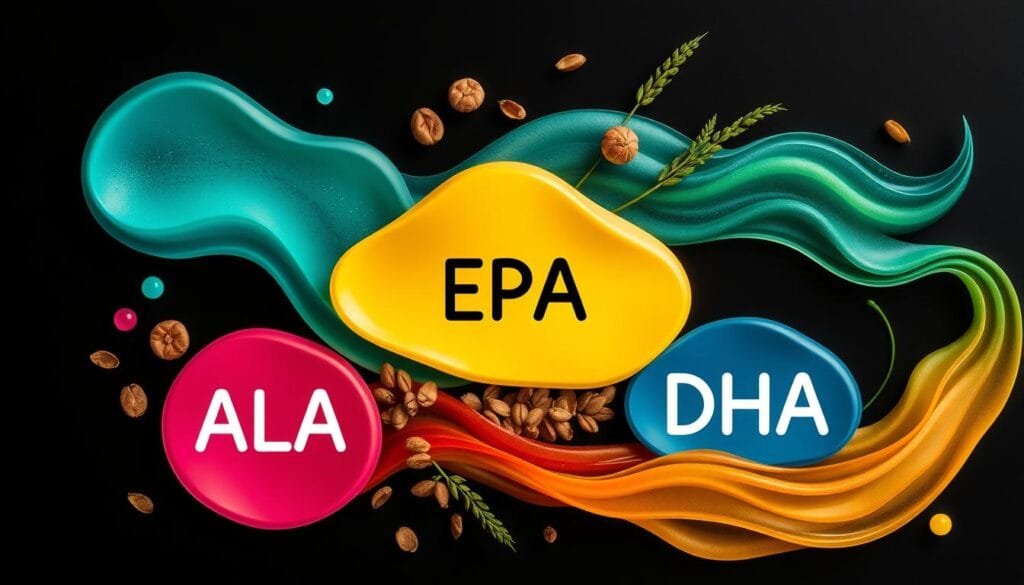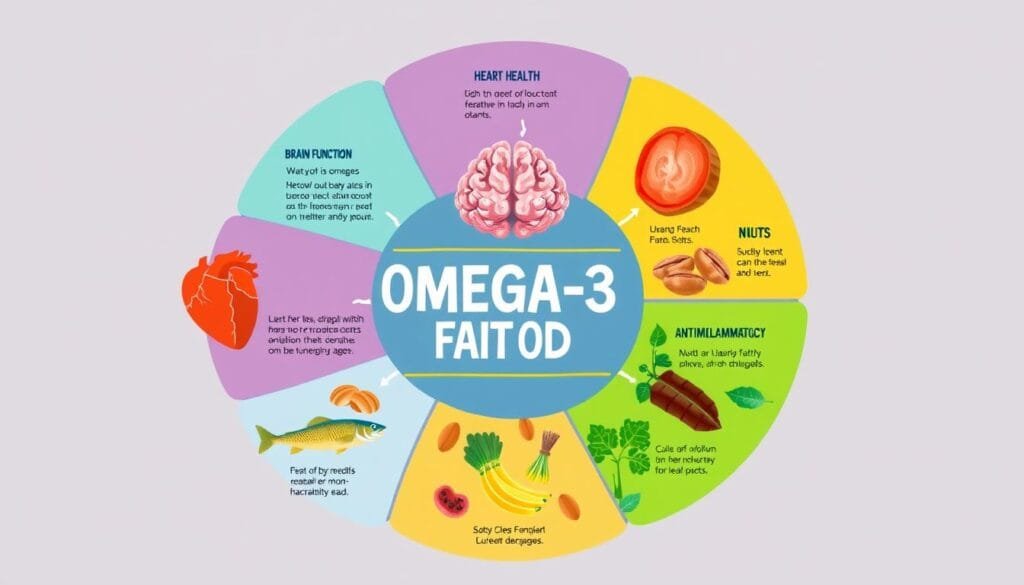Ever felt like your body is fighting an invisible battle? Omega-3 fatty acids might be the secret weapon you need. These powerful fats are more than just a trend; they’re vital for your health.
Imagine having a natural ally for your heart, brain, and overall health. Omega-3s are key to reducing heart risks and boosting brain function. They’re essential nutrients your body needs but can’t make itself.
Knowing the benefits of omega-3s is key for better health. Whether you’re into fitness, health, or natural wellness, omega-3s are a great choice. They offer a promising path to feeling your best.
Table of Contents
Understanding Essential Omega-3 Fatty Acids and Their Role
Omega-3 fatty acids are vital for your health. Your body can’t make them, so you need to get them from food or supplements. These fats are essential for staying healthy.

What Are Polyunsaturated Fats?
Polyunsaturated fats are healthy fats your body needs. They can’t make them by themselves. These fats have special bonds that help your body work right.
Why Our Bodies Need Omega-3s
- Support cardiovascular health
- Reduce inflammation
- Promote brain function
- Enhance cell membrane structure
Omega-3s are important for health. The American Heart Association says you should eat 250-500 mg of EPA and DHA each day. This helps your heart.
Natural Sources vs. Supplements
Getting omega-3s from food is good, but supplements help too. Natural sources include:
- Fatty fish like salmon and mackerel
- Chia seeds
- Walnuts
- Flaxseeds
“Your diet plays a key role in getting these essential fatty acids. They support your health and well-being.” – Nutrition Experts
The FDA says don’t take more than 3 grams of EPA and DHA daily. Don’t take more than 2 grams from supplements.
The Three Main Types of Omega-3 Fatty Acids
It’s important to know the different types of omega-3 fatty acids for their health benefits. Not all omega-3s are the same. Each type has its own role in keeping your body healthy.

- DHA (Docosahexaenoic Acid)
- EPA (Eicosapentaenoic Acid)
- ALA (Alpha-linolenic Acid)
DHA: Brain Development Powerhouse
DHA is key for brain growth and function. It’s vital for infants and kids. Your brain needs DHA to work well and communicate.
EPA: Inflammation Fighter
EPA fights inflammation in your body. It may lower the risk of chronic diseases. Foods like salmon and mackerel are rich in EPA.
ALA: Plant-Based Omega-3
ALA is found in plants like flaxseeds and walnuts. Your body can turn ALA into EPA and DHA, but not much. Vegetarians and vegans mainly get omega-3s from ALA.
“Not all omega-3s are created equal – each type brings unique benefits to your health.” – Nutrition Expert
Getting a mix of these omega-3s is good for your health and well-being.
Para que sirve el omega 3: Primary Health Benefits

Omega-3 fatty acids are key to better health. They support many body systems and protect against health issues.
The benefits of omega-3 are vast and important for several health areas:
- Reducing inflammation throughout the body
- Supporting cardiovascular health
- Enhancing brain function
- Protecting mental wellness
Research on omega-3 fatty acids keeps uncovering new facts. Studies show they might help with:
- Potential cancer prevention strategies
- Depression management
- ADHD symptom reduction
For those with omega 3 y artritis, the news is good. Omega-3s may reduce joint pain and stiffness, helping those with chronic conditions.
“Omega-3 fatty acids are not just supplements, they’re essential nutrients that support our body’s complex healing mechanisms.” – Dr. Andrew Weil
Your body can’t make these fatty acids on its own. So, eating omega-3-rich foods or taking supplements is vital for health. Adding them to your diet can greatly improve your overall well-being.
Rich Natural Sources of Omega-3
Learning about the best omega-3 sources can change how you eat. Whether you’re looking for fish or plant-based options, knowing where to find them is key for good health.
Your body needs omega-3s, and nature has many ways to give them to you. You can get them from fish and plants, each with its own benefits.
Marine Sources of Omega-3
Fatty fish are top choices for omega-3s. They offer powerful health benefits through their aceite de pescado omega 3:
- Salmon: High in DHA and EPA
- Mackerel: Dense omega-3 content
- Sardines: Compact nutritional profile
- Herring: Excellent marine source
Plant-Based Omega-3 Options
If you’re looking for vegan omega-3 options, there are great plant sources:
- Chia seeds
- Flaxseeds
- Walnuts
- Algae-based supplements
Dietary Recommendations
Experts say to eat fatty fish two to three times a week. This helps keep your omega-3 levels right while avoiding too much mercury.
Your diet should aim for about 1000 mg of omega-3 daily. Mix marine and plant sources for the best nutrition.
Heart Health and Cardiovascular Benefits
Keeping your heart healthy is key, and omega-3 fatty acids are a big help. These nutrients are vital for heart health, lowering the risk of heart problems.
Studies show omega 3 y enfermedades cardiovasculares can be greatly improved with the right diet. The main benefits are:
- Lowering blood fat levels
- Reducing blood pressure
- Lessening the chance of irregular heartbeats
- Slowing down artery plaque buildup
Medical research shows omega 3 y enfermedades cardíacas have a big impact. Every year, about 18 million people die from heart disease worldwide. Omega-3s can help by:
- Keeping cholesterol levels healthy
- Reducing blood vessel inflammation
- Boosting heart muscle function
“Omega-3 fatty acids are a powerful ally in maintaining cardiovascular health.” – American Heart Association
The American Heart Association suggests eating up to 4g of EPA and DHA daily for heart health. Adding omega-3 rich foods or supplements to your diet can help keep your heart well.
Brain Function and Mental Health Benefits
Omega-3 fatty acids are vital for brain health and mental wellness. They help your brain work well and keep your emotions balanced.
Omega-3 fatty acids do more than just feed your body. They are key for brain growth and keeping your mind healthy.
Cognitive Development
Docosahexaenoic acid (DHA) is a major omega-3 fatty acid. It’s important for brain health. It helps with:
- Neuronal membrane flexibility
- Synaptic communication
- Brain cell protection
Depression and Anxiety Support
Research links omega-3 fatty acids to better mood. Eating enough omega-3s may help with:
- Lowering inflammation that can affect mood
- Helping neurotransmitters work better
- Lessening depression symptoms
Memory Enhancement
Omega-3 fatty acids boost your brain’s function. Eating fatty fish and taking supplements can improve:
- Memory retention
- Cognitive performance
- Reducing cognitive decline with age
“Nutrition is the foundation of brain health, and omega-3 fatty acids are key players in cognitive wellness.” – Neuroscience Research Institute
By focusing on omega-3 intake, you’re investing in your brain’s health and function for the long term.
Omega-3 During Pregnancy and Early Development
Pregnancy is a time when your body needs extra nutrients. Omega 3 is key for both you and your baby’s health. It helps meet your baby’s complex needs.
Omega 3 is important for your baby’s brain and eye growth. DHA, a part of omega 3, helps with brain development during pregnancy.
“Proper omega 3 para el embarazo intake can significantly impact your child’s cognitive ability”
- Supports fetal brain development
- Enhances visual system maturation
- Reduces inflammation
- Promotes healthy birth weight
It’s important to choose safe omega-3 sources during pregnancy. Wild-caught fish like salmon and sardines are good choices. They have low mercury levels. If you’re worried about fish, look for pure omega-3 supplements.
The amount of DHA you need is between 200-300mg daily. Talk to your doctor to find the best omega-3 plan for you.
Note: Always choose high-quality, mercury-free omega-3 sources to protect maternal and fetal health.
Recommended Dosage and Safety Guidelines
Knowing the right amount of omega 3 is key to getting health benefits without risks. It’s important to think about your health needs and follow intake guidelines.
Daily Intake Recommendations
The amount of omega 3 you should take depends on your age, health, and any health issues. Here are some general guidelines:
- Healthy adults: About 250-500 mg of EPA and DHA daily
- People with heart disease: Up to 1,000 mg a day
- Athletes and those who are active: 1,000-2,000 mg daily
Potential Side Effects
It’s good to know about possible mild side effects of omega 3:
- Fishy taste
- Mild stomach upset
- Small chance of bleeding
“Always talk to your doctor before starting any new supplement.” – Nutrition Experts
Drug Interactions and Precautions
Omega-3 supplements can affect how some medicines work, like blood thinners. If you’re on prescription drugs, check with your doctor about possible interactions.
The usual safe dose is about 1,000 mg a day for most adults. Only a small part of ALA turns into EPA and DHA (about 5% for EPA and 0.5% for DHA). So, taking EPA and DHA directly is often better.
Special Considerations and Precautions
It’s important to know the special things to think about when taking omega-3. Omega 3 y sistema inmunológico has many health benefits. But, different things can affect how well it works and how safe it is for you.
Before you start taking omega-3, think about these important things:
- See your doctor if you have health problems
- Watch out for allergies, mainly with fish-based supplements
- Check your current omega 3 y colesterol levels
- Think about how omega 3 para la piel might affect you
Some people need to be extra careful. If you have bleeding problems, are about to have surgery, or take blood thinners, talk to your doctor. Not having enough omega 3 can cause symptoms, so getting checked is key.
“Knowledge and careful consideration are your best allies in omega-3 supplementation.” – Nutrition Experts
Here are some groups that need extra attention:
- Pregnant women
- Children and teens
- Older adults
- People with long-term inflammation
More than 30% of U.S. adults have too much inflammation. With most people not getting enough omega-3 (only 33 mg/day when they need 500 mg/day), knowing your nutritional needs is very important.
Always get advice from your doctor before taking omega-3. This way, you can make sure you’re getting the best health benefits.
Conclusion
Omega-3 fatty acids are a powerful nutritional resource with profound implications for your health. They offer a wide range of benefits, from heart health to brain function. These essential nutrients provide a natural way to improve your overall well-being.
By making smart dietary choices, you can harness the omega 3 antiinflamatorio properties. Research shows these fatty acids can help manage inflammation. This could lower the risk of chronic conditions. Also, studies suggest omega 3 might help with weight management and metabolic health.
Omega 3 also plays a key role in eye health. It may help prevent age-related vision problems. Adding fatty fish, plant-based sources, or supplements to your diet can support your health. Always talk to a healthcare professional to find the right amount of omega-3 for you.
As research on omega-3 fatty acids grows, making informed dietary choices is key to long-term wellness. View these nutrients as a vital part of a holistic health plan.






